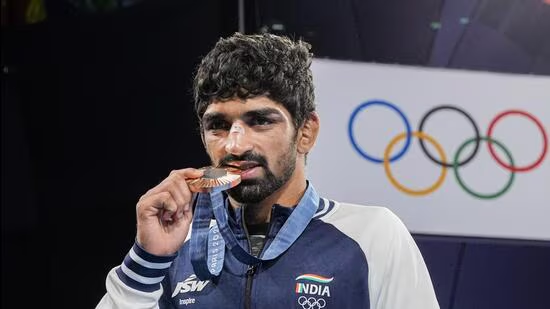21 august 2024 : On the morning of his competition at the Paris Olympics, Aman Sehrawat found himself under an unprecedented level of pressure. “Everyone back home is watching me. People in my village are following my match, and the entire nation is focused on my performance. What if I fail?” These thoughts raced through his mind as he prepared for his bout.
Aman’s ascent in Indian wrestling has been remarkable. In just two years, he transitioned from being the nation’s first U23 world champion to becoming India’s youngest Olympic medallist, much like his inspiration and Chhatrasal teammate, Ravi Dahiya, who won silver at the Tokyo 2021 Olympics. Aman’s initial significant challenge was to defeat Ravi and secure his place at the Olympics. He accomplished this, dispelling any doubts regarding his ability to maintain India’s streak of winning at least one wrestling medal in every Olympic Games since Beijing in 2008.
However, as the day in Paris drew near, he began to feel anxious. It was the Olympics, and the 21-year-old, who had courageously faced numerous adversities throughout his life, including the loss of his parents at a young age, was now grappling with self-doubt. Yet, the 57kg wrestler found reassurance within himself, recognizing that the stage was rightfully his.
“Had I not experienced those difficult times, I might not have been able to secure a medal for my country,” Aman reflects on his journey.
“There was nothing at home. We lacked the financial means for training and nutrition. However, those hardships strengthened me and motivated my training. I believed that winning an Olympic medal would improve my financial situation. I practiced tirelessly with that aspiration in mind.”
It was time for him to pursue his dream in Paris. He won his first bout decisively against Vladimir Egorovy of Macedonia through technical superiority before facing a formidable opponent he had encountered at the world championships—Albania’s Zelimkhan Abakarov, the reigning 57kg world champion.
“He beat me 10-0 at the world championships. So, I knew If I had to bring a medal, I will have to somehow win this bout. I went there with the strategy that I don’t want to give him any points at the start and keep it as close as possible. And I was ready for a long bout.”
The plan worked. Beating Abakarov 12-0 was a massive upset, and Aman was ready for his semi-final against Japan’s Rei Higuchi, another big name in wrestling.
“With the Japanese, I lost four early points and my mind was full of negative thoughts. I hurried to cover up and ended up losing more points and could never recover.”
Aman reflected on what struck him as the Japanese raced to victory.
“It was the first day and I felt so much pressure thinking that everyone would be watching me in India, in my village. So, I was worried about the outcome of the match.”
He came back fresh the next day with a new approach – he shed 3.5kg overnight to make his weight for the bronze medal bout.
“I just thought I am not going to think I am competing at the Olympics. I will take it as just another bout in a state-level competition. I told myself it doesn’t matter if I win or lose, or what people thought, I will focus only on the bout and my game.”
Aman trounced Puerto Rico’s Darian Toi Cruz 13-5 to claim bronze.
Winning an Olympic medal felt normal. Until he landed in India and saw his village, his academy, friends and wrestling fans turn out to greet him at the airport.
“I was surrounded by the media in Paris and gave interviews one after another. I didn’t feel like I had won an Olympic medal. It was only after I returned to India that I realised what I have achieved. So many people came to receive me at the airport and honoured me. Everyone was so happy at Chhatrasal; they were singing, dancing. I never thought an Olympic medal could bring so much happiness.”
In the crowd, there were two people he had a lot to thank. His roommate Sagar, a Greco-Roman wrestler, who has played a pivotal role in Aman’s career, and Ravi Dahiya, the 57kg Tokyo silver medallist, who has been a constant source of his strength.
“My father brought me to Chhatrasal in 2014. I wanted to do pehlwani. I had heard the names of Sushil (Kumar) and Satpal pehelwan. So, he brought me. My mother passed away in 2013 because of illness. After 5-6 months, my father passed away. My uncle took care of me and my sister. At Chhatrasal, Sagar was my brother and guardian. When he got the job in the Air Force in 2018, he spent his salary on my wrestling.
“Ravi was so happy to see me. He told me “it is just the start for you. You will compete in two more Olympics. Make sure that you keep your focus in the sport and prepare better for the future’.”

